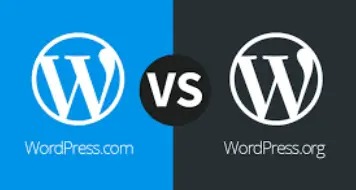Difference between WordPress.org and WordPress.com

WordPress is one of the most popular and versatile content management systems (CMS) for creating and managing websites. However, there are two distinct versions of WordPress, each with its own features, advantages, and limitations: WordPress.com and WordPress.org. In this comprehensive comparison, we’ll explore the differences between these two platforms to help you make an informed choice for your website needs.
1. Hosting:
- WordPress.com: WordPress.com is a fully hosted platform. This means that WordPress.com takes care of hosting your website on their servers. You don’t need to worry about the technical aspects of server management, such as server setup, maintenance, or performance optimization. This can be a significant advantage for users who want a hassle-free solution.
- WordPress.org: WordPress.org, on the other hand, is a self-hosted platform. You need to find your own web hosting provider and set up your WordPress website on that hosting. While this gives you more control over your website’s server environment, it also requires you to take responsibility for finding a reliable hosting service, managing server configurations, and ensuring server security. Self-hosting provides greater flexibility but demands more technical expertise.
2. Customization:
- WordPress.com: WordPress.com allows some level of customization. You can choose from a selection of pre-designed themes and customize them to a certain extent. However, the extent of customization depends on your subscription level. On the free plan, your options are relatively limited. Custom CSS is available on higher-tier plans, but you can’t install custom themes or plugins unless you’re on a Business or eCommerce plan. This can be restrictive for users who want complete control over their website’s design and functionality.
- WordPress.org: With WordPress.org, you have complete control over your website’s design and functionality. You can install any theme or plugin, whether free or premium, to customize your site as you see fit. This flexibility makes WordPress.org highly versatile, allowing you to create a website that is truly unique and tailored to your specific needs. If you’re a developer or have access to development resources, you can even create your own themes and plugins to extend WordPress’s functionality further.
3. Domain Name:
- WordPress.com: If you use the free plan on WordPress.com, your website’s URL will include “wordpress.com” (e.g., yoursite.wordpress.com). To have a custom domain (e.g., yoursite.com), you need to purchase it separately, which may incur additional costs. Custom domains are available with premium plans, giving you the option to use a more branded and professional web address.
- WordPress.org: With WordPress.org, you can use any custom domain name you choose, giving you full control over your website’s URL. You can register a domain through various domain registrars, and this domain can be tailored to suit your brand, niche, or personal preferences. This flexibility is essential for businesses and individuals who want complete ownership of their website’s identity.
4. Monetization:
- WordPress.com: Monetization options on WordPress.com are limited, especially if you’re on the free plan. In some cases, WordPress.com may display ads on your site, and you have limited control over this. With premium plans, such as the Business and eCommerce plans, you can earn ad revenue, sell products, and access more monetization options. However, there are still some restrictions, and WordPress.com may take a percentage of your earnings.
- WordPress.org: With self-hosted WordPress.org, you have complete control over how you monetize your website. Whether you want to display ads, engage in affiliate marketing, sell products, or offer premium content, the choice is entirely yours. You have the flexibility to choose the best monetization strategy for your website and keep 100% of your earnings without sharing revenue with a hosting platform.
5. Maintenance:
- WordPress.com: WordPress.com takes care of many technical aspects for you, including software updates, security, and backups. This is a significant advantage for users who want a more hands-off experience. You can focus on creating content and managing your website’s design without worrying about the underlying technical details.
- WordPress.org: With self-hosted WordPress.org, you are responsible for maintaining and updating your website. This includes keeping the core WordPress software, themes, and plugins up to date. You also need to handle security measures and create a backup system. While this demands more technical knowledge and effort, it gives you complete control over your website’s security and performance.
6. Cost:
- WordPress.com: WordPress.com offers a free plan with basic features. However, the free plan comes with limitations, including the use of a subdomain (e.g., yoursite.wordpress.com) and restrictions on customization. Premium plans are available on a subscription basis, each offering different features and customization options. The cost of these premium plans varies, with higher tiers providing more functionality.
- WordPress.org: The WordPress software itself is free and open-source, but you need to budget for other costs. This includes web hosting, domain registration, and potentially premium themes and plugins. The cost of hosting and additional services can vary widely, depending on your hosting provider and the specific features you require. While it may initially appear more expensive due to hosting and domain expenses, it offers greater long-term flexibility and control.
7. Security:
- WordPress.com: WordPress.com takes care of security to a large extent. They implement measures to protect your website from common security threats and issues. This can be reassuring for users who are not well-versed in website security practices.
- WordPress.org: Security is primarily in your hands when you self-host with WordPress.org. While this offers greater control, it also means you must be proactive in implementing security best practices. This includes regularly updating your WordPress core, themes, and plugins, using strong passwords, and potentially installing security plugins to protect your site from various online threats. For users with the necessary knowledge and diligence, this level of control can result in a highly secure website.